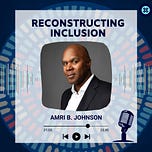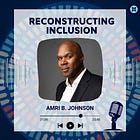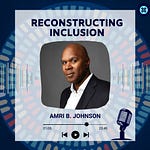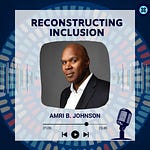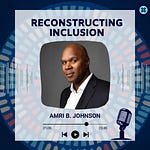Welcome to the Reconstructing Inclusion Podcast!
As a pioneer in the DEI space with over decades of practical experience, Howard Ross offers a nuanced take on the current backlash against inclusion efforts and charts a path forward that prioritizes human connection over ideological entrenchment.
Howard, who founded Cook Ross (where I once worked) and authored influential books including "Everyday Bias," brings the valuable perspective of someone who has witnessed multiple cycles of progress and retrenchment in social justice work. Now 74, and describing himself as "rewired not retired," he provides context for understanding today's challenges by connecting them to historical patterns of advancement and backlash in American social progress.
Our conversation moves beyond the typical defensive posture many DEI practitioners have adopted in response to recent attacks, instead offering a thoughtful exploration of how inclusion work can evolve to meet this moment. Through examining the distinction between change agency and activism, unpacking the principles versus practices of DEI work, and considering how practitioners might effectively navigate an increasingly hostile political landscape, we explore strategic adaptation while maintaining core commitments to human dignity and belonging.
Understanding Tribal Politics and DEI Pushback
Howard views the current backlash against DEI initiatives as part of a broader shift in American political culture from what he calls a "bell curve society" to a "dumbbell curve society," where polarization has replaced moderation as the norm.
"We've gone from a Bell curve society where most people are kind of in the middle and on one side or the other, but sort of on the moderate side... to a dumbbell curve society where everything's on the end and nothing's in the middle. And the notion of working with somebody across the aisle is considered pretty much by both sides to be betrayal." [00:08:30]
This framing provides crucial context for understanding why DEI work has become such a lightning rod. The attacks on diversity initiatives aren't happening in isolation but as part of a broader political strategy in our increasingly polarized environment.
Howard goes on to explain that within this divisive context, DEI work has become a convenient target for political operatives looking to galvanize opposition. Yet he maintains a dual perspective, acknowledging both the targeted nature of the attacks and the legitimate critiques that exist within our field.
"Have there been missteps in the diversity, equity, and inclusion world? Of course, there have been missteps... However, this is also a terrorist attack against this field for a particular purpose. Because, for example, taking down the pictures of Dr. King in Department of Defense schools has nothing to do with identity stuff. What this is about is a way to push back the progress we've made over these years." [00:11:45]
I found myself agreeing with Howard's assessment but pushed him to go deeper. While some attacks are purely political, others might be responding to legitimate concerns about how DEI work has been conducted. This kind of nuanced conversation is exactly what we need more of in our field, especially when discussing topics that often generate more heat than light.
Performative vs. Cosmetic: Rethinking DEI Implementation
One of the most insightful portions of our conversation addresses the difference between superficial DEI initiatives and truly transformative organizational change. Howard offers a helpful framework for understanding different levels of DEI work.
"I think that you have three concepts that get collapsed here. There's what you're calling cosmetic, and then there's what I would call performative, and then there's symbolic. And there are times when symbolism is really important. And the problem is when you don't go anywhere beyond the symbolism... it breeds more cynicism when things are more performative." [00:13:50]
This distinction resonates deeply with me. I've been critical of shallow approaches to DEI work throughout my career, and Howard's framework gives language to something I've observed repeatedly - that not all DEI work is created equal, and that practitioners need to be strategic about the kinds of interventions they champion.
Howard continues by explaining that DEI practitioners have come from different backgrounds and training traditions, which has led to inconsistent approaches. He particularly highlights the difference between practitioners with organizational development backgrounds versus those coming from activism.
"You've got people who are activists who really believe in a topic as activists, but they haven't necessarily understood the ability to make things happen in the organization... The way to be a change agent as opposed to how to be an activist. And there are two different skill sets. You can have both... When I'm out marching... that will be me as an activist. When I'm working with people in an organization, I'm a change agent. It's a different set of skills." [00:15:30]
I strongly affirm this distinction. Post-George Floyd, many organizations experienced a collapse of the activism role into organizational life, which created tensions and ultimately proved less effective than organizational change approaches. What we've done is collapse the activism role into organizational life, and I haven't found that to be effective. I understood why people felt the way they felt after George Floyd's murder, but it didn't create the space needed for real organizational transformation.
Moving Forward: Practical Strategies for DEI Practitioners
Our conversation shifted to practical advice for DEI practitioners navigating the current climate. Howard advocates for a strategic approach that prioritizes impact over ideological purity.
"Use your emotion, use your passion, use your upset, your anger, all that stuff to motivate you energetically. But you think your strategy. You don't feel your strategy. You think your strategy... So like a good example is right now the whole war on words... everybody wants to get rid of equity... I'm not gonna give up my word. It's like hell, what I say, call it Eleanor, for all I care. I don't give a damn what you call it. Find a way to keep doing the work." [00:33:00]
I responded with a practical example, noting how the Society for Human Resource Management (SHRM) shifted away from using the term "equity" while still advancing inclusion through a focus on civility. When SHRM decided to let go of the E from their efforts, some of my colleagues went ballistic. I pointed out, "Did you see what else SHRM did? SHRM started focusing on civility. What do we need right now, more than pretty much anything, is companies are facing the potential for gross levels of incivility." SHRM was skating to where the puck was going. This example illustrates how organizations can adapt their language while maintaining their commitment to creating more inclusive environments.
We both agreed that practitioners need to focus less on terminology and more on the substantive impact of their work. The importance lies in meeting organizations where they are and finding language that will allow the work to continue.
"Everybody has got to find in their organization what's the appropriate language to use that will enroll people in their organization... If he can get people to continue doing the work by turning it into DI and C or whatever they decided to land on, as far as I'm concerned, if he wants to keep doing the work that way, God bless him. Let's keep moving forward." [00:34:30]
This pragmatic approach represents a necessary shift from the ideological rigidity that has sometimes characterized DEI work. Our conversation demonstrates how seasoned practitioners can maintain their values while adapting their approaches to changing circumstances - something our field desperately needs right now.
The Historical Arc: Finding Hope in Perspective
As our conversation wound down, I asked Howard what gives him hope about the future of DEI work. His response draws on his historical training and decades of experience to place current challenges in context.
"If you really are a historian, if you do look at history, you can't help but believe the statement that the arc of history bends towards justice... Because it's true. I mean, with everything that's going on, this is still the best time in the history of the planet relative to equality and things like that. Now, that doesn't mean we don't still have a long way to go. But it's never been a straight path. It's always been three steps forward, two steps back." [00:39:00]
This historical framing provides a powerful reminder of the cyclical nature of social progress. As Howard articulated how our current moment fits into a larger pattern of advancement and retrenchment that has characterized American history since at least the Civil War, I found myself gaining a broader perspective on our current challenges.
Howard concluded with a powerful call for practitioners to prioritize human connection across political divides.
"Whichever end of this tribal structure you feel yourself pulled towards... lean towards the middle in terms of searching for the humanity in people on the other side... The more we know each other for who we are, the less we treat each other like what we are. The more we know each other as our neighbor Paul, who voted for Trump as opposed to a Trumpist." [00:44:00]
Key Takeaways
Context matters: The current DEI backlash is happening within a broader pattern of political polarization where moderate positions are increasingly difficult to maintain. Understanding this context helps practitioners respond more effectively.
Change agency differs from activism: Effective organizational change requires a different skillset than activism. While both have value, collapsing these roles has created challenges for DEI practitioners working in organizational settings.
Prioritize impact over terminology: Being flexible about language while maintaining commitment to core principles allows the work to continue even in challenging political environments. The goal should be advancing inclusion, not defending particular terms.
Recognize the historical pattern: Social progress has always followed a "three steps forward, two steps back" pattern. The current retrenchment, while painful, is part of a larger historical arc that ultimately bends toward justice.
Center on humanity, not ideology: The path forward requires practitioners to see the humanity in those who disagree with them, focusing less on being right and more on healing divisions through genuine connection.
About the Guest:
Howard Ross is a lifelong social justice advocate and one of the world's seminal thought leaders on identifying and addressing unconscious bias. He is the author of three influential books, including the Washington Post bestseller "Everyday Bias," and founded Cook Ross Inc., a leading Diversity and Inclusion consultancy which he led until 2018.
With expertise in synthesizing neuro-cognitive and social science research for practical application, Ross has implemented large-scale organizational culture change efforts across 47 U.S. states and over 40 countries worldwide. His work spans academic institutions, Fortune 500 companies, healthcare organizations, and government agencies. Notably, he served as the Johnnetta B. Cole Professor of Diversity at Bennett College for Women, making history as the first white man to hold such a position at an HBCU.
A prolific writer and speaker, Ross's insights appear in prestigious publications including Harvard Business Review, The Washington Post, and The New York Times. He appears monthly on National Public Radio and regularly keynotes at major conferences. His contributions to diversity and inclusion have earned him numerous accolades, including the Operation Understanding Award for Community Service and the Leadership in Diversity Award from the World Human Resources Development Conference in Mumbai.
Resources:
Everyday Bias by Howard Ross - Howard mentions that a third edition, co-authored with his son Jake, is forthcoming with new content on AI, social media, and how bias impacts tribalism and belonging.
IDEAS Generation - An organization for younger DEI practitioners co-founded by Dan Egol, a former Cook Ross employee.
The Fire Next Time by James Baldwin - Mentioned by Howard as a transformative book that changed his worldview when he read it in 1966.


